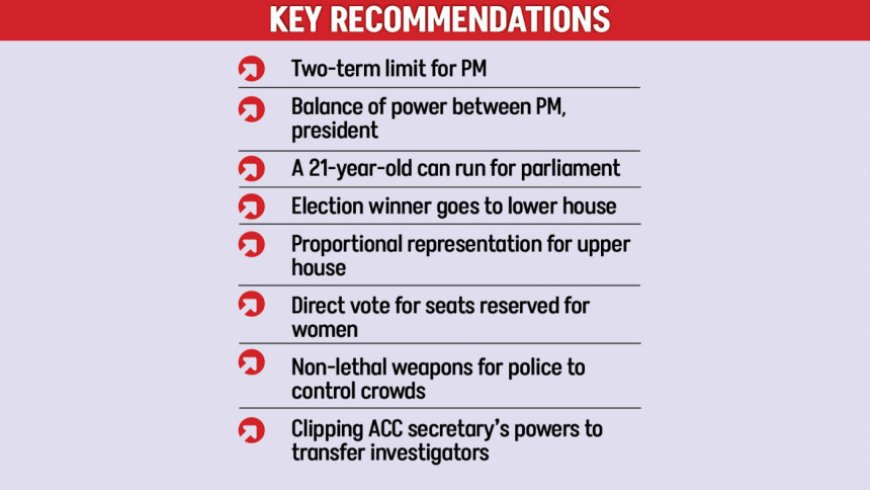Reform panels are designed to maintain a balanced distribution of power
Key recommendations expected to be made tomorrow include the establishment of a caretaker government and a bicameral parliament.

Four reform commissions are poised to submit their reports to the government tomorrow, with the Constitution Reform Commission and the Electoral Reform Commission expected to propose a caretaker government system and a bicameral parliament. The Police Reform Commission may recommend that the police use only non-lethal weapons in crowd control to prevent fatalities, aligning with European standards. Meanwhile, the Anti-Corruption Commission Reform Commission is considering a recommendation to prohibit bureaucrats from holding secretary- to director-level positions at the ACC.
According to sources within the Constitution Reform Commission, its proposals may include a two-term limit for prime ministers to reduce the head of government's absolute power. The commission may also suggest creating a balance of power between the prime minister and the president. Additionally, it is likely to recommend lowering the minimum age for running for parliament from 25 to 21.
The Electoral Reform Commission is expected to propose the formation of a high-level parliamentary committee, led by the Speaker and comprising representatives from political parties, to hold election commissioners accountable for any irregularities. Furthermore, the commission is considering a dual voting system, with the first-past-the-post (FPTP) method for the lower house and proportional representation for the proposed upper house.
Ali Riaz, head of the Constitution Reform Commission, Badiul Alam Majumdar, head of the Electoral Reform Commission, Iftekharuzzaman, head of the ACC Reform Commission, and Safar Raj Hossain, head of the Police Reform Commission, confirmed to this newspaper that they are ready to submit their reports tomorrow.
"The balance of power will not be limited to just the president and prime minister. It will extend to creating more institutions to monitor the government's executive branch and prevent the prime minister from misusing power," Ali Riaz told The Daily Star.
Badiul Alam mentioned that their recommendations would be discussed within the government and with political parties in the hopes of reaching a consensus.
Since taking office in August, the interim government has formed at least 15 reform commissions to strengthen weakened democratic institutions and establish a state system rooted in public ownership, accountability, and welfare. The first six reform commissions, focused on the constitution, electoral system, police, judiciary, public administration, and ACC, were established on October 3 with a 90-day deadline for submitting their reports.
The Judiciary Reform Commission's deadline has been extended to January 31, while the remaining five commissions are set to submit their reports by January 15.
Other Recommendations:
The Constitution Reform Commission is expected to suggest adding principles of equality, human dignity, and social justice to the preamble, in line with the 1971 Liberation War proclamation. The commission also plans to propose enhancing parliamentary standing committees' ability to monitor the executive branch and hold the prime minister accountable. Additionally, it may recommend repealing Article 70 of the constitution, which restricts MPs from voting against party lines.
The Electoral Reform Commission is set to recommend reintroducing the "No" vote option on ballots and direct election for seats reserved for women. The commission also advocates for increasing the number of seats for women from 50 to 100 and raising the total number of lawmakers in the lower house from 350 to 400. The proposal also includes creating 100 seats in the upper house.
The commission is likely to recommend a non-party caretaker government system during elections, amending laws related to the appointment of election commissioners, and expanding the authority of the Election Commission (EC) under the Representation of the People Order (RPO). They are also considering requiring candidates to disclose their foreign assets in affidavits, with provisions for verifying this information.
The Police Reform Commission is expected to recommend freeing law enforcement agencies from political influence and focusing on reducing corruption and ensuring accountability through exemplary punishments for offenders. The commission may also propose guidelines in line with High Court and Appellate Division directives on arrests without warrants under Section 54 of the Code of Criminal Procedure (CrPC) and the treatment of individuals on remand under Section 167 of the CrPC. These guidelines include requiring police officers to disclose their identity, recording reasons for arrests, notifying the arrestee's relatives, and allowing access to legal representation.
The ACC Reform Commission is considering recommendations to ensure that neutral individuals are appointed as ACC commissioners and chairpersons. The commission may also propose repealing a controversial provision in the ACC Employees (Service) Rules that grants the ACC secretary absolute authority to transfer investigation officers and dismiss employees without prior notice. Additionally, the commission is looking into expanding the ACC from three to five members and establishing ACC offices in all 64 districts, up from 36.
What's Your Reaction?





















































































